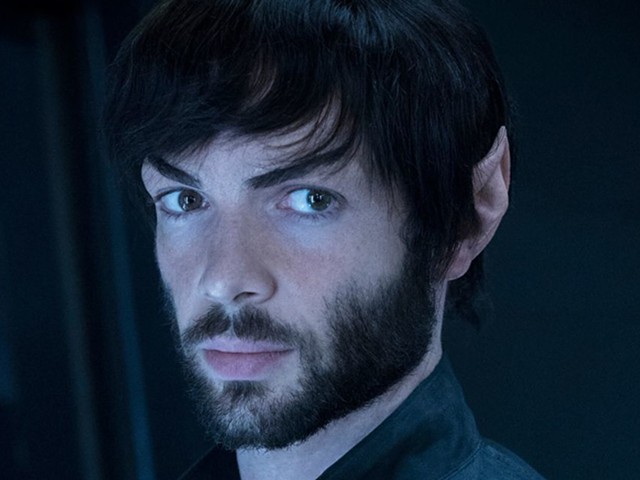Elisabeth Moss skids through most of Her Smell like a live grenade, ricocheting off the other performers as they live in constant fear of her detonation. Whether this might be triggered from within or without is unclear, but in her case, such an event could mean a lot of things: a meltdown, a disappearance, an injury to someone around there or her own person, a hurtful, devastating spitting of words. She hurls a lot of those, too — as Becky Something, the lead for alt-rock outfit Something She, her dialogic ramblings shift into alliterative, theatrical registers alongside more conventional slang. Even when she's off her game, Becky is many things all at once. But for most of the film's action, she's two primarily: a creative force and a threat to those around her.
We've all seen artists self-immolate onscreen before, but this work (blessedly free from "nonfiction" constraints) stands out as more credible than most of them. In what's still an often histrionic — but ultimately a quite mature — work, writer-director Alex Ross Perry depicts band life as focused on what every musician I've ever met tells me it is: interpersonal politics. Onstage as on film sets, uniting a group of disparate creative minds to have them produce something dissonant and harmonious — expressive and comprehensible in all the right ways — takes a small miracle every time, whether it's in a studio setting or on tour. That reality's well-accounted for here, with an excellent cast (Dan Stevens, Cara Delevingne, Eric Stoltz, among others) tiptoeing around Becky's coke-fueled, often violent waves of feeling.
Knowing this, Perry himself leans on his usual collaborators here, with indie stalwart Sean Price Williams shooting (credits include Good Time and Thirst Street) and Robert Greene (himself a director, of works like Actress and Kate Plays Christine) taking deftly to the challenge of cutting together the film's florid scenework. The evident mixture of creative independence and ultimate synergy here of all involved mirrors that of the band (though I suspect the set was more peaceful), a dynamic that provides all the nonfiction basis a story of this kind should ever need.
Playing on the familiar slide and attempted recovery of a popular recording artist, Williams in particular feels freed to be relentless in his willingness to push his camerawork further. Bathing much of the film stock in the hothouse hues of overripe watermelon only to alternate them with earthy, vaguely industrial desaturated greens and blues, there's a sense of creative restlessness strongly at play here. His camera's highly mobile too, with crane shots gliding in and out in an early live performance. (Greene jump-cuts in between these with liberty, grounding his jarring technique with an enduring focus on Becky.)
This same performance is mirrored in one of the film's very best scenes — and at times one of its cooler ones — in which the band attempts to regroup, at Becky's demanding behest, for a studio recording session. Here Moss attempts to cultivate a kind of religious focus, slumped on a stool over her guitar in a T-shirt and a sequined skirt, feeling herself in a kind of private space. As she alternates between attempts to perform and lashing out at her bandmates and manager, Williams pushes in and out with his camera, framing her through the glass while the environment quiets her outbursts on the sound design and the architecture divides or unites characters in power and headspace. There's more to it, but this extended scene becomes unexpectedly a masterwork of control, of tonal shifts, and how we regard the characters. With its fluid, natural juxtaposition of reflections, its touchingly gentle zooms and fades, and its lack of irony as the cast seems to flicker in and out of self-awareness, this studio footage is the film's crowning achievement. It lets each character exist as both subject and object, only intermittently aware of each other's regard, feelings, wants.
Less gripping but still accomplished is the backstage footage that takes up most of the film. Behind the scenes, the camera wheels about as Williams chucks shadows at odd places, as though he'd scrawled with a sharpie over some bandmate's jaw. Greene and Williams working together embrace lengthy but not over-choreographed long takes, wide compositions that splay chic and gangly across the screen, and finely julienned micro-cuts all at once. It's difficult in watching to know how this all came together — and while the effort isn't smooth, it feels artistically deliberate, an attempt to capture a particular pain, ecstasy, and sometimes mania that's offset by the movie's cooler moments. Without those, such peaks wouldn't mean much, primarily for lack of context.
But what precisely is this frenzied movie's subject? There's a case to be made here that its chief topic is its formal substance: the fury and texture of its actors' performances, the ways light can wash over its film stock, the scrappy, sharp-witted, and strongly individualized design of the band's costumes, album covers, and respective postures.
Moss's in particular suggests a specific power, even mystique. The odd pips and starts in her verbal demeanor — showed charmingly as quirks on Mad Men before she embraced herself — now seem indicative of something roiling inside her. Like Tom Cruise's used to (they're both Scientologists), her intensity can seem outsized and off-putting. And yet hers is more sustained and fluid, feeling — at least here — less for show. As she's grown older she's fully embraced her physicality, her build and gestures, her broad forehead and her downturned mouth. In Her Smell, she's possessed of a certain power, directed at times by a paid religious guru backstage, a power that can be easily misused.
Over its course, Her Smell details a kind of shift in faith, a movement of allegiance from the self, abstracted, to others and a more grounded sense of self. With its vision of band life as requiring constant maintenance, a perpetual rending and re-suturing of wounds, Perry shows a kind of faith in women, a belief in what they can do to and for each other, in femininity as a shared and (to him) somewhat mysterious bond. He knows these characters and believes in them, too, but their experience is fleshed out by performance and presence, ultimately and intimately theirs. In declining to answer for these women or make any sorts of excuses, Her Smell allows them to speak for themselves.
Stay on top of Detroit news and views. Sign up for our weekly issue newsletter delivered each Wednesday.






